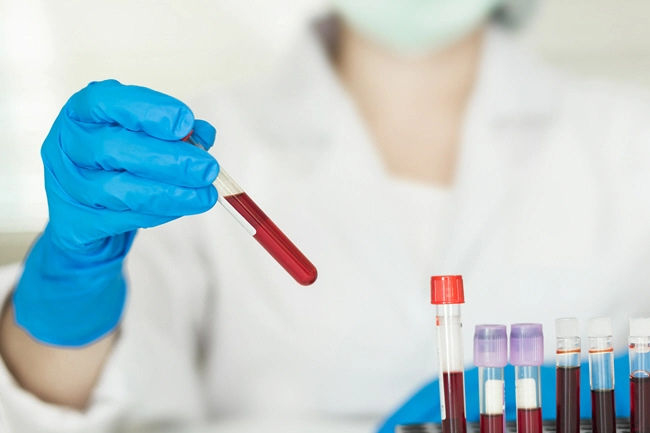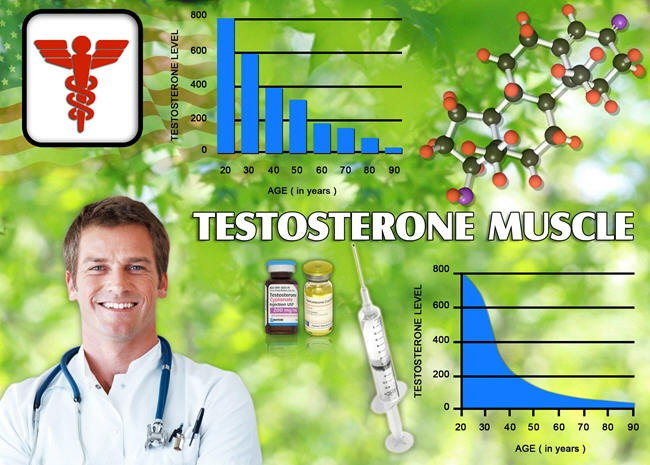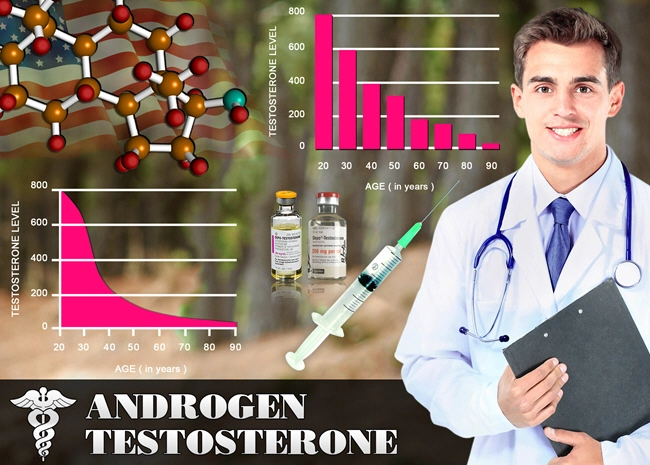
Video Link: https://vimeo.com/289669455
Video Download: Click Here To Download Video
Video Stream: Click Here To Stream Video
Sex Hormone-Binding Globulin:
An overlooked biomarker that is so vital to your testosterone levels
Here’s what you need to know about this crucial piece of the testosterone puzzle
It’s a fact. Testosterone is essential...absolutely essential to your good health. When a man’s testosterone levels are reasonable, the results are a healthy libido, a robust immune system, high energy, mental sharpness, powerful muscles, and an optimistic approach to dealing with life’s problems.
 Conversely, when a man’s testosterone levels are below average he will experience a broad range of symptoms: constant fatigue, elevated stress, moodiness, joint aches and pains, weakened, shrinking muscles, unwanted weight gain, accumulation of grotesque, repulsive fat, headaches, erectile dysfunction (ED), and a severely diminished sex drive.
Conversely, when a man’s testosterone levels are below average he will experience a broad range of symptoms: constant fatigue, elevated stress, moodiness, joint aches and pains, weakened, shrinking muscles, unwanted weight gain, accumulation of grotesque, repulsive fat, headaches, erectile dysfunction (ED), and a severely diminished sex drive.
Not a pretty picture. The importance of maintaining healthy testosterone levels cannot be over-emphasized.
Many biomarkers play a critical role in maintaining healthy testosterone levels as well as keeping all of your hormones in the correct balance. And that includes the biomarker called Sex hormone-binding globulin (SHBG).
What is Sex hormone-binding Globulin?
Before we go any further, a definition of sex hormone-binding globulin is in order. Sex hormone-binding globulin is a carrier glycoprotein manufactured mainly by the liver. SHBG plays a crucial role in the release of unbound testosterone into the bloodstream.
Why is this so important? Because sex hormone-binding globulin holds the key that unlocks your bound testosterone and turns it into free testosterone. Free testosterone then springs into action and delivers all of testosterone’s many benefits.
SHBG is bound to 17 different sex hormones in the body, including testosterone. When testosterone escapes from this binding, it becomes bioavailable, or free to go wherever it is needed. Free testosterone can cross the blood-brain barrier and can go to work by entering fat cells and muscles.
Here’s the Bad News
 Approximately two-thirds of testosterone in the blood is bound to SHGB, and another 30-40 per cent of testosterone is attached to another substance called albumin, which is a type of protein produced by the liver.
Approximately two-thirds of testosterone in the blood is bound to SHGB, and another 30-40 per cent of testosterone is attached to another substance called albumin, which is a type of protein produced by the liver.
Do the math. The above numbers mean that a mere 2-3 % of testosterone is free. Here’s a good analogy: This is similar to a Thoroughbred racehorse that is stuck in the starting gate.
The horse is anxious and ready to explode, but can’t get going since the gate is locked.
In other words, if testosterone is bound up, it’s not able to fulfill its life-enhancing role.
The Ratio of SHBG and Testosterone is Also Important to Women
You read that right. As mentioned earlier, SHBG plays an essential role in testosterone availability. Here is a little-known fact: women need testosterone. Women don’t require as much testosterone as men. But if a woman experiences a drop in testosterone, she will suffer the consequences as well.
If a woman has high levels of SHBG, her testosterone levels will plummet just like what men experience. She will also suffer many of the same adverse effects of low testosterone (“Low-T”) as men.
The level of SHBG in your body speaks volumes about your hormones, your insulin resistance, and your stress levels. 
Sadly, this all-important metric is often overlooked by too many physicians and deemed irrelevant. This oversight shifts the focus on the body’s full testosterone levels or total testosterone.
The crucial thing to remember is this: free testosterone is the “gold-standard” of testosterone measurements.
Testosterone must be free to do its job.
The Causes of High Levels of Sex Hormone-Binding Globulin
Several conditions can elevate the level of SHBG in men:
- Stress.
- Aging.
- Liver disorders, especially cirrhosis.
- Hyperthyroidism.
- Smoking.
- Increased conversion of testosterone to estrogen.
- Alcohol abuse.
- The side effects of specific medications.
- Testicular cancer.
- Finasteride and other hair-loss drugs.
In women, there are a few different causes of high SHBG levels in addition to the reasons mentioned for men: 
- Elevated estradiol levels.
- Birth control pills.
- Pregnancy stress causes cortisol levels to skyrocket.
- Excessive weight-loss is often seen in anorexia.
- Fibrocystic disease of the breasts.
However, the SHBG/Testosterone Ratio is a Delicate Balance
That’s right. As awful as it is for having high levels of sex hormone-binding globulin, low levels of the protein are a recipe for a broad range of health problems as well as high levels. Here’s why.
SHBG is a master regulator of your body’s sex hormone levels. There is a fine line between testosterone and estrogen. Both of these vital hormones play a critical role in maintaining our health, especially in older people.
Researchers have determined that everyone, regardless of age or gender, needs an optimized hormonal profile.
Like the canary in the coal mine, recent studies have concluded that imbalances of sex hormones are often predicted by irregularities in SHBG. Elevated levels of these hormones allow excessive growth of breast cancer-promoting cells in women.
Conversely, low SHBG levels lead to raised levels of low-density lipoprotein (LDL, the “bad cholesterol”) and triglycerides.
 Low SHBG levels affect both genders by an increased risk of heart disease, high blood pressure, and type 2 diabetes.
Low SHBG levels affect both genders by an increased risk of heart disease, high blood pressure, and type 2 diabetes.
Earlier we discussed the problem of bound testosterone that occurs when SHBG levels are elevated. With a large percentage of free testosterone unavailable, men may experience traits of feminization as more and more of their testosterone is efficiently incarcerated.
These undesired developments may include gynecomastia (the appearance of fatty breast tissue that results in the dreaded “man boobs”), sexual impotence, low energy, and mental confusion (“brain fog”).
But the Problems Don’t Stop There
If SHBG levels drop below average, other adverse health afflictions raise their ugly heads. Perhaps the worst effect of low SHBG levels is the unwanted appearance of the dreaded metabolic syndrome.
This hideous condition is accompanied by an entire cast of loathsome characters: insulin resistance, obesity, chronic high blood pressure, and high cholesterol and triglyceride levels.
Low SHBG and total testosterone in men are precursors of metabolic syndrome. In women, high estrogen and low SHBG levels also predict metabolic syndrome as well as infertility, polycystic ovary syndrome, acne, and uterine cancer, especially in obese women.
As if all of this weren’t bad enough, when metabolic syndrome strikes, insulin levels explode higher, which lowers SHBG levels. This action creates a vicious cycle.
Studies have shown that women with low SHBG levels are at high risk for developing diabetes.
Here is a list of conditions in men that cause low SHBG levels:
- Hypothyroidism
- Excessive androgen action
- Insulin resistance and diabetes
- Hyperprolactinemia
For women, in addition to the above list of causes of low SHBG for men, PCOS (polycystic ovarian syndrome) also may result in low SHBG levels.
The Bad News Parade Continues
Almost every measurable indicator of cardiovascular disease such as C-reactive protein (CRP), raised triglyceride levels, low-density cholesterol (LDL), and arterial calcification is linked to low SHBG.
 In men, high levels of SHBG are especially troublesome, since this often leads to infertility, erectile dysfunction, and diminished libido. Also, high levels of SHBG are involved in building muscle and recovering from workouts.
In men, high levels of SHBG are especially troublesome, since this often leads to infertility, erectile dysfunction, and diminished libido. Also, high levels of SHBG are involved in building muscle and recovering from workouts.
Finally, recent research has concluded that high SHBG levels reduce bone mass in both men and women. This problem happens because SHBG binds to estrogen. Left unchecked, the result is often osteoporosis.
In fact, many researchers are recommending routine measurement of SHBG as an early indicator of osteoporosis.
Steps You Can Take Immediately to Balance Your Hormones
Earlier we discussed many of the common causes of abnormal SHBG levels. Now it’s time to consider solutions to this affliction.
- Nutrition. As with so many health conditions, diet is at the top of the list. For women with low SHBG and an excess of testosterone and estrogen, slashing your calories may be helpful in raising SHBG levels and decreasing testosterone and estrogen. But do not choose this approach if you are attempting to increase the levels of those hormones for health-related reasons or optimal sports performance.
- The correct balance of fitness training. Exercise is a vital component of robust health. But there is also the possibility of overdoing it. Too much of a good thing can be as bad as too little. Over-training increases cortisol (also known as “the stress hormone”) and can lead to burnout. When this unfortunate development occurs your SHBG levels skyrocket and testosterone plunges. A balanced approach is needed -- and we will provide you with that approach.
- A vegetarian diet. A study on SHBG levels compared to 21 meat-eating, middle-aged females with 19 middle-aged female vegetarians. All had unhealthy low levels of SHBG. The study lasted for one year and concluded that a plant-based protein diet raised SHBG levels higher in the vegetarian women compared to the meat-eating women while not lowering testosterone. The study also recommended that women with low testosterone should consider eating more meat.
- Supplements. Magnesium, zinc, stinging nettle root, Tongkat Aki (“Long-Jack”), Boron, and vitamin D all help to lower SHBG.
Hopefully, you can see that the case has been made with the substantial evidence presented that the correct balance of SHBG is critical for your continued well-being.
Shockingly, many physicians do not test for this essential regulating protein. But that is changing. Researchers are finally recommending SHBG testing as an additional predictor of metabolic and cardiovascular risk.
Our Clinic is Ahead of the Curve
When you begin a hormone replacement therapy treatment protocol at our clinic, your levels of total testosterone, free testosterone, and SHBG will be carefully monitored. A blood test for testosterone and SHBG is an efficient way to “look under the hood” and determine what therapies are needed for you to enjoy an optimized hormonal profile.
 Your levels of SHGB, testosterone, and estrogen all play crucial roles in the life-and-death struggle against aging and its accompanying breakdowns.
Your levels of SHGB, testosterone, and estrogen all play crucial roles in the life-and-death struggle against aging and its accompanying breakdowns.
Once we know your baseline, we will know precisely what prescribed course of action is required to restore your SHBG levels to a healthy balance.
Everything that can affect your hormones will be analyzed in detail, from nutritional changes and your fitness routine to serious lifestyle modifications.
Slowly but surely mainstream medicine is concluding that the measurement of SHBG is a valid and reliable predictor of metabolic and cardiac diseases.
This awareness is something our clinic has recognized for years. We are an industry leader in all aspects of hormone replacement therapy (HRT). We will ensure that your levels of each and every hormone is known before we begin your hormone therapy.
And that includes the all-important level of SHBG.
Contact us for the latest, most efficient, and innovative approach to hormone replacement.
Reference
Aging and the Male Reproductive System.
Contact Us Today For A Free Consultation
Dear Patient,
Once you have completing the above contact form, for security purposes and confirmation, please confirm your information by calling us.
Please call now: 1-800-380-5339.
Welcoming You To Our Clinic, Professor Tom Henderson.

- LabCorp Announces a Change to the Testosterone Reference Range [Last Updated On: April 16th, 2025] [Originally Added On: June 23rd, 2019]
- Important Facts About Testosterone Therapy Before Buying [Last Updated On: April 18th, 2025] [Originally Added On: July 13th, 2019]
- Soy: Does it Lower Testosterone? [Last Updated On: October 18th, 2024] [Originally Added On: August 30th, 2020]
- Testosterone Treatments May Successfully Reverse Type-2 Diabetes in Some Men [Last Updated On: April 15th, 2025] [Originally Added On: November 13th, 2020]
- Testosterone Replacement Therapy (TRT) May Prevent Heart Attacks and Diabetes [Last Updated On: April 21st, 2025] [Originally Added On: November 17th, 2020]
- Did You Know? Recent Studies Have Confirmed the Link Between Low Testosterone (“Low-T”) and Depression. [Last Updated On: April 17th, 2025] [Originally Added On: January 10th, 2021]
- New Study Finds Testosterone Does Not Increase Your Heart Attack Risk [Last Updated On: April 14th, 2025] [Originally Added On: January 11th, 2021]
- The Great Testosterone Debate [Last Updated On: April 20th, 2025] [Originally Added On: January 14th, 2021]
- Testosterone Replacement Therapy Lowers Heart Attack Risk [Last Updated On: April 19th, 2025] [Originally Added On: January 18th, 2021]
- New Study Says: The Benefits of Testosterone Replacement Therapy Outweigh The Risks [Last Updated On: April 22nd, 2025] [Originally Added On: January 19th, 2021]
- Male Menopause. Fact or Fiction ? [Last Updated On: April 23rd, 2025] [Originally Added On: January 20th, 2021]
- Testosterone: How Much Do You Really Know About This Masculine Hormone? [Last Updated On: October 6th, 2024] [Originally Added On: February 9th, 2021]
- Low-T: What are healthy levels of Testosterone and why is it difficult to measure? [Last Updated On: September 11th, 2025] [Originally Added On: April 3rd, 2021]
- Testosterone Therapy May Be Good for the Heart if You Have Low-T [Last Updated On: May 3rd, 2025] [Originally Added On: July 21st, 2021]
- A Recent Study Concludes: Testosterone DOES NOT Cause Prostate Cancer [Last Updated On: September 14th, 2025] [Originally Added On: August 16th, 2021]
- In the Battle Against Aging, When do the Risks Outweigh the Rewards? [Last Updated On: April 4th, 2025] [Originally Added On: August 18th, 2021]
- New Study Concludes: Boosting Testosterone Levels Lowers Men's Death Risk [Last Updated On: May 11th, 2025] [Originally Added On: August 20th, 2021]
- Testosterone Replacement Therapy Slows Prostate Cancer! [Last Updated On: April 2nd, 2025] [Originally Added On: September 13th, 2021]
- Research proves that Testosterone Therapy Boosts Fertility! [Last Updated On: April 5th, 2025] [Originally Added On: September 26th, 2021]
- Testosterone Does Not Cause Heart Attacks [Last Updated On: April 7th, 2025] [Originally Added On: October 15th, 2021]
- Testosterone and Women [Last Updated On: April 8th, 2025] [Originally Added On: October 15th, 2021]
- Testosterone and Metabolic Syndrome [Last Updated On: April 3rd, 2025] [Originally Added On: October 15th, 2021]
- Testosterone and Disease Prevention [Last Updated On: March 31st, 2025] [Originally Added On: October 15th, 2021]
- Judge Vacates $140 Million Verdict in Testosterone Lawsuit [Last Updated On: April 1st, 2025] [Originally Added On: October 15th, 2021]
- Testosterone and Estrogen [Last Updated On: April 9th, 2025] [Originally Added On: October 16th, 2021]
- Testosterone and Aging [Last Updated On: April 10th, 2025] [Originally Added On: October 16th, 2021]
- Testosterone Replacement Therapy (TRT) Benefits [Last Updated On: April 11th, 2025] [Originally Added On: October 16th, 2021]
- Testosterone and Male Menopause [Last Updated On: March 30th, 2025] [Originally Added On: October 16th, 2021]
- Testosterone Battles Obesity [Last Updated On: March 29th, 2025] [Originally Added On: October 16th, 2021]
- Why You Need Testosterone Replacement Therapy [Last Updated On: May 14th, 2025] [Originally Added On: October 16th, 2021]
- Testosterone FAQ's [Last Updated On: May 13th, 2025] [Originally Added On: October 25th, 2021]
- How Testosterone Impacts Sexual Preferences In Men and Women [Last Updated On: March 28th, 2025] [Originally Added On: October 30th, 2021]
- Growth Hormone and The Thyroid Gland [Last Updated On: April 24th, 2025] [Originally Added On: November 19th, 2021]
- How Does Masturbation Affect Testosterone Levels? Exploring the Science [Last Updated On: May 24th, 2025] [Originally Added On: March 27th, 2022]
- Testosterone Therapy Increasingly Used to Help Men Take Control of Aging [Last Updated On: May 25th, 2025] [Originally Added On: May 30th, 2022]
- The many benefits of Testosterone Replacement Therapy (TRT) [Last Updated On: November 1st, 2025] [Originally Added On: June 13th, 2022]
- Tlando Testosterone - A Brand New Way to Treat Low-T Safely with a Testosterone Pill [Last Updated On: May 28th, 2025] [Originally Added On: July 12th, 2022]
- Safe Tlando Testosterone Changes Landscape of Low-T Therapy [Last Updated On: May 30th, 2025] [Originally Added On: August 15th, 2022]
- Systems to Monitor Testosterone Replacement Therapy (TRT) [Last Updated On: October 12th, 2025] [Originally Added On: September 21st, 2022]
- Testosterone May Help You Keep Your Job (Or Find Another) [Last Updated On: June 12th, 2025] [Originally Added On: October 4th, 2022]
- Toxic Chemicals are Killing your testosterone…And your Manhood! [Last Updated On: October 28th, 2024] [Originally Added On: October 10th, 2022]
- A new study reveals that Testosterone improves body composition in men with low testosterone! [Last Updated On: October 22nd, 2025] [Originally Added On: October 17th, 2022]
- A former Mr. Olympia speaks about testosterone [Last Updated On: October 10th, 2025] [Originally Added On: November 8th, 2022]
- Testosterone Blockers Thwart Melanoma [Last Updated On: June 9th, 2025] [Originally Added On: December 11th, 2022]








